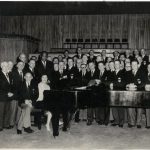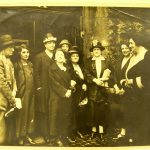Coronation Celebrations: Change and Continuity
On the 8th of September 2022, Queen Elizabeth II died after reigning for 70 years. She came to the throne, a young woman of 27, her coronation taking place on the 2nd of June 1953. It was only 8 years since the end of World War II, the National Health Service had begun in 1948, finally providing free healthcare to all, televisions were starting to replace radios as a form of entertainment at home and employment levels were rising (The History Press, date unknown). The majority of food rationing had come to an end (Bodleian, 2011).
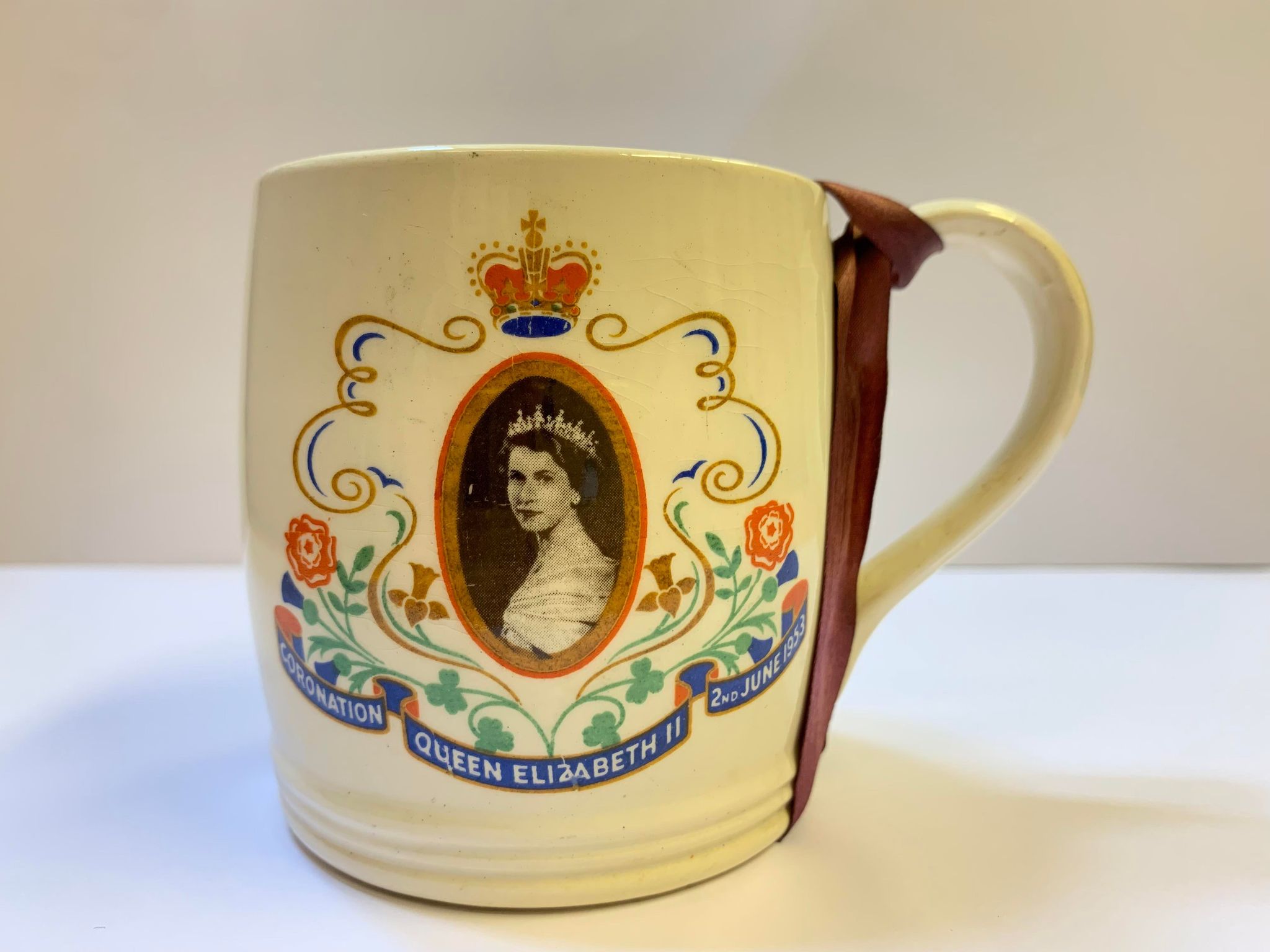
ACVMS.1998.1868 Queen Elizabeth II Coronation mug
In contrast to this, her son, Charles Phillip Arthur George, will be crowned on May the 6th 2023, at the age of 73. He is the longest-serving prince of Wales (BBC, 2017). Charles will be crowned against the backdrop of a nation dealing with a cost-of-living crisis, a war in Ukraine and multiple strikes across many professions from Nurses and Teachers to Train Drivers. Society is also grappling with the issues of climate change, leading to amongst other things increased flooding and loss of resources (Met Office, date unknown).
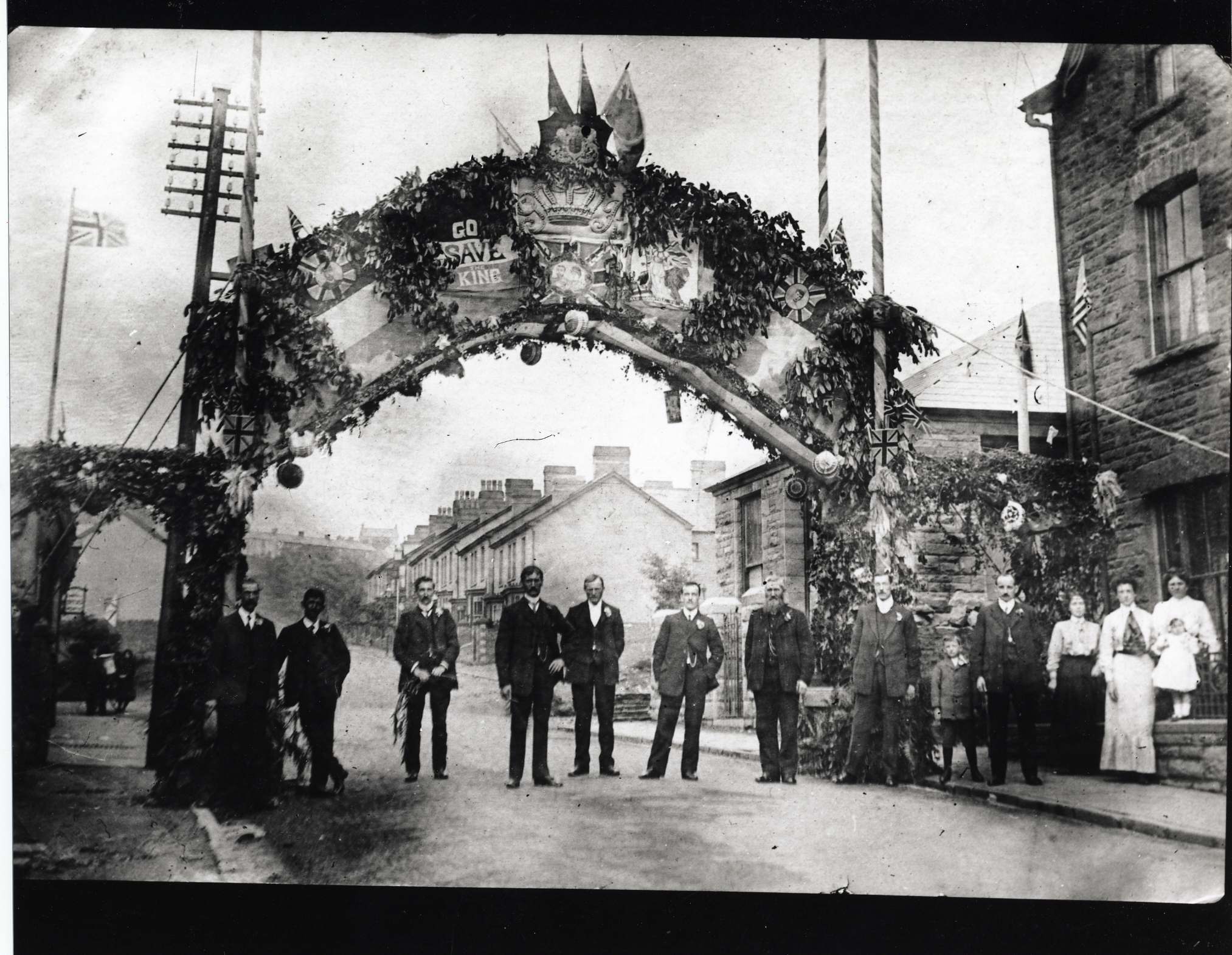
ACVMS.1998.3543 Glancynon Terrace, Coronation Arch, 1911
Against these two vastly different backdrops of the two Coronations, 70 years apart, is the question of whether they will be celebrated differently, if at all, by families or communities?
At the heart of the Coronation is family, the passing of a crown from a Mother to her son, and the pageantry and celebration that entails. Bringing this to the more personal level is also about family, the stories that have been handed down, and how they will be remembered by future generations. My father-in-law, Mr D Williams, residing in Merthyr Tydfil at the time of the 1953 Coronation remembers it quite vividly. He lived with his parents and three younger siblings in a small, terraced house, being 14 at the time of the Coronation. He had many extended members of the family living in the streets around him, and one was his Aunty Margaret, who had the only TV in the small community (bought especially for the event). On the day of the Coronation, her house was packed with so many people, that some even watched through the front room window. Those who couldn’t watch or get access to the TV went to the cinema.

ACVMS.2019.35 Elizabeth II Coronation Programme, 1953.
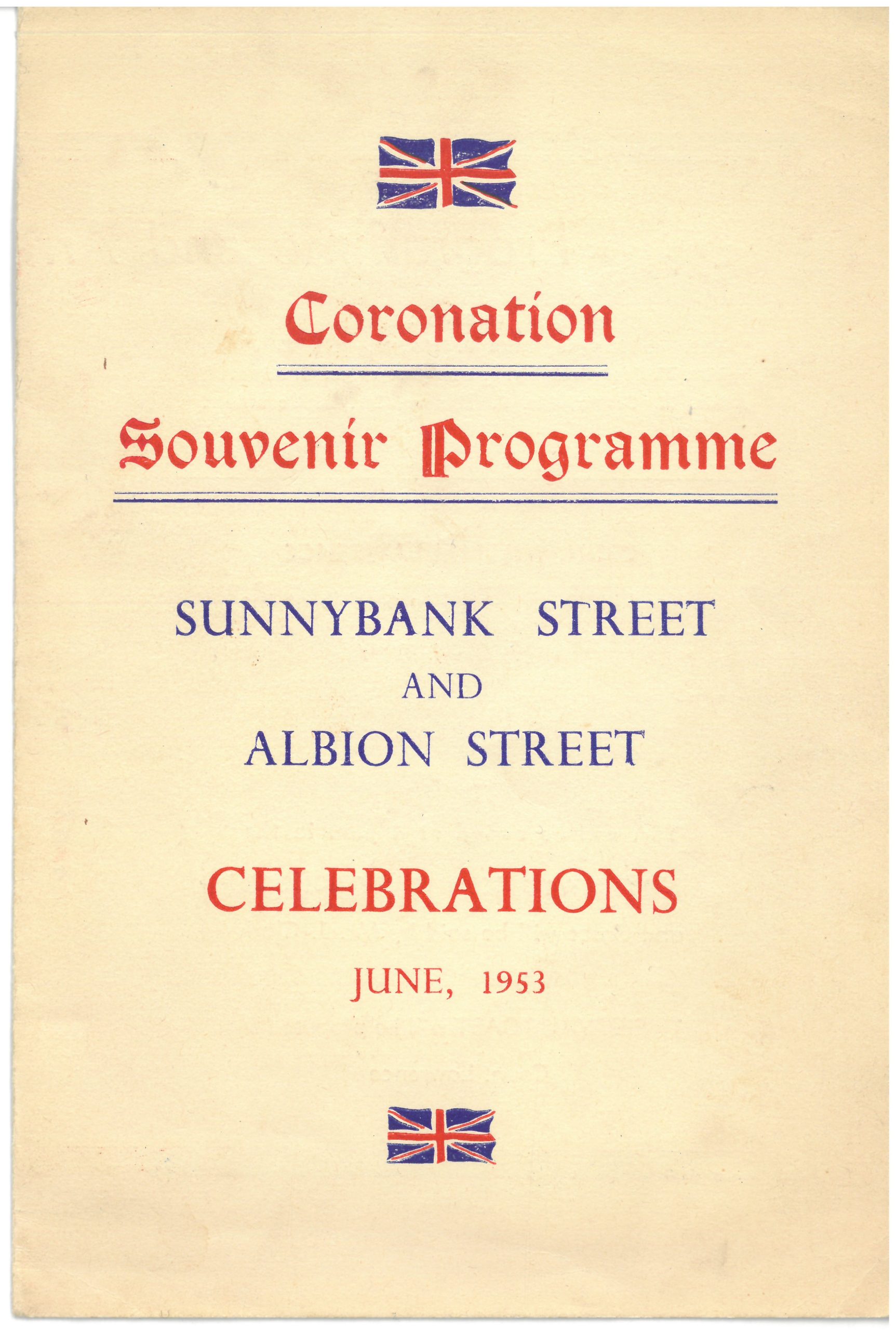
It must have been so exciting, knowing that millions of people around the world were watching at the same time, one of the first of this type of shared event (Science Museum, 2018). It was found from subsequent surveys that for each television showing the Coronation, there was an average of 17 people watching (Science Museum, 2018). The quality of the TV in 1953 was not the HD widescreen experience of today, the TV screen was no more than 23 inches, and the low resolution left pictures grainy (The Guardian, 2010). The experience of watching the Coronation will be a very different experience today. Most if not all homes have access to a TV. Accessing a TV has changed, with streaming services and binge-watching entire series becoming the norm (Ofcom, 2022).
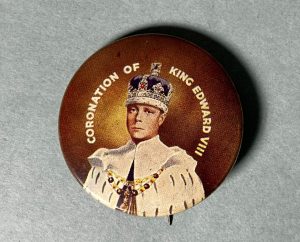
ACVMS.2016.45 Edward VII Coronation Badge.
Within our contemporary society, will the shared experience of everyone watching the same thing at the same time occur? And if so, will it have the same impact?
Will there be the same urgency to be sat down to watch the TV at 11 am on the 6th of May, to watch this Coronation take place?
The Coronation itinerary starts at 6 am when the viewing areas will open along the main procession route (Daily Mail, 2023) and it will be, in some way, televised from that moment on. No longer do we, as the viewer, rely on the specialist camera that gave a static and privileged view to the masses in 1953 (Science Museum, 2018). Now the masses bring the filming to us, with mobile phones providing a more personal experience and taking the point of view away from the main broadcaster. This can make for much more immediate and intimate viewing, with people’s personal experiences of the Coronation uploaded instantly.
Therefore, in conclusion, technology has advanced and the demographic of family life has changed. Will these changes impact the excitement and interest of contemporary viewers in comparison to the 1953 Coronation? Although the grainy pictures of 1953 did not give the immediate and intimate viewing of the modern smartphone, it still allowed millions of people to share an event that would have been unthinkable just a few years earlier. The Coronation of 1953 was a united viewing experience that was shared across society’s barriers. Will the same be said of the 2023 Coronation amongst future generations?

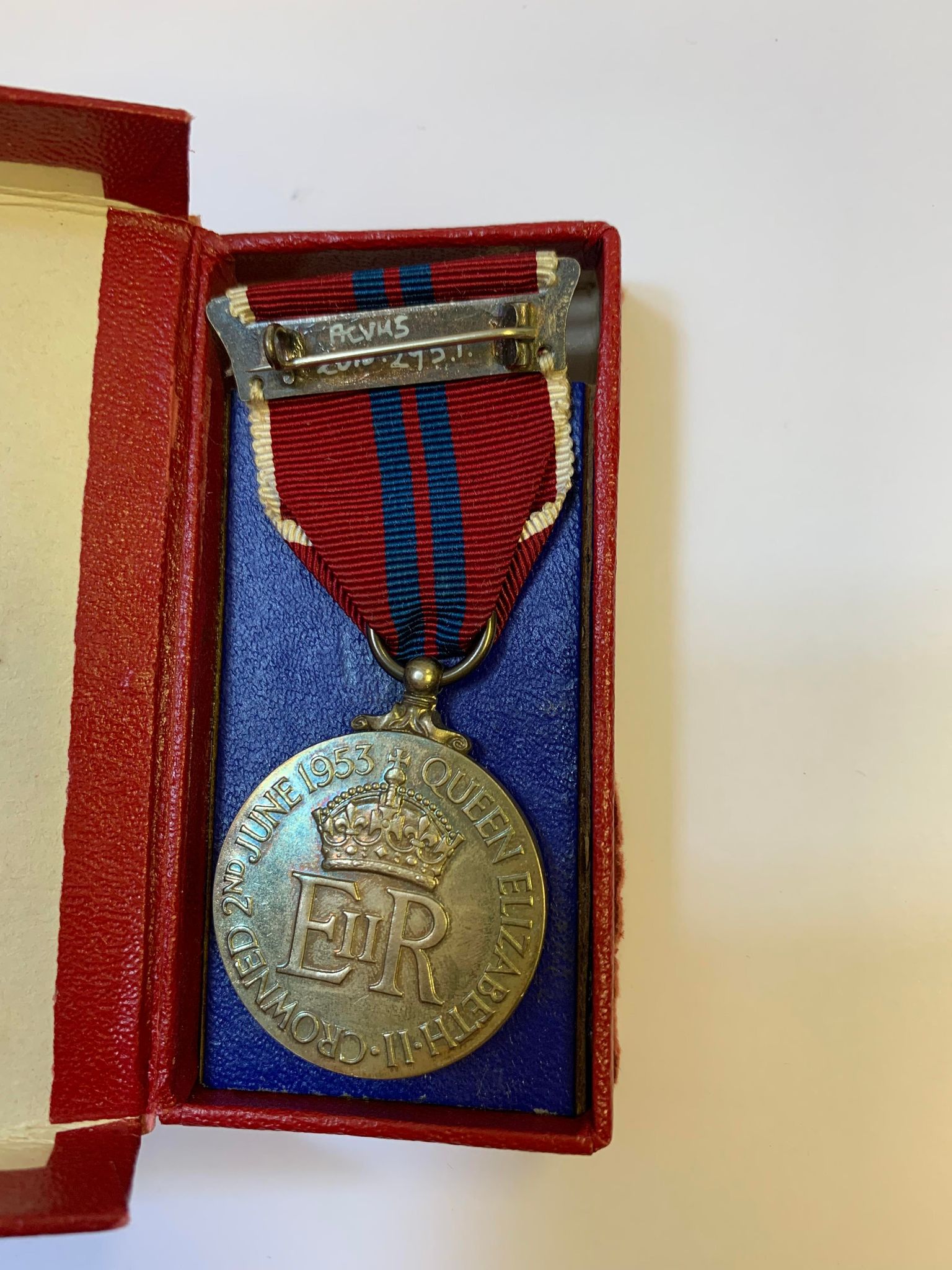
ACVMS.2010.295 Coronation medal – circular metal ‘Queen Elizabeth II, crowned 2nd June, 1953’ red/blue/white ribbon attached – original box – red oblong cardboard – ‘1953 ER Coronation Medal’ written in black on the front of box.
Blog post written by volunteer, Gillian Rowles-Williams
References:
- The History Press, Reminiscences of the Queen’s Coronation, (date unknown), Available from: https://www.thehistorypress.co.uk/articles/reminiscences-of-the-queen-s-coronation/
- Bodleian Library Blog, On this day in 1954: Food rationing ends after 14 years, (2011), Available from: https://blogs.bodleian.ox.ac.uk/archivesandmanuscripts/2011/07/04/on-this-day-in-1954-food-rationing-ends-after-14-years/
- BBC News, Nicola Bryan, Prince Charles is longest-serving Prince of Wales (2017), Available from: https://www.bbc.co.uk/news/uk-wales-41179772
- Met Office (date unknown), Effects of Climate Change, Available from: https://www.metoffice.gov.uk/weather/climate-change/effects-of-climate-change
- iNews, Victoria Murphy, Coronation guest list: What the slimmed down attendance reveals about King Charles, Available from: https://inews.co.uk/inews-lifestyle/coronation-guest-list-what-the-slimmed-down-attendance-reveals-about-king-charles-230497
- The King, About The King, Available from: https://www.royal.uk/the-king
- Science Museum, Television Reigns: Broadcasting Queen Elizabeth’s Coronation, (2018), Available from: https://www.sciencemuseum.org.uk/objects-and-stories/television-reigns-broadcasting-queen-elizabeths-coronation
- The Guardian, Televisions through the years, (2010), Available from: https://www.theguardian.com/media/gallery/2010/jul/07/televisions-through-the-years 2010
- Ofcom, Streaming revolution stretches TV generation gap, (2022), Available from: https://www.ofcom.org.uk/news-centre/2022/streaming-revolution-stretches-tv-generation-gap
- Daily Mail, Zac Campbell, King Charles III coronation schedule, (2023), Available from: https://www.dailymail.co.uk/news/article-12024813/King-Charles-III-coronation-schedule-listevents-itinerary-timings-historic-day.html 2023
- Slate Technology, Jane C.Hu, How Smartphone Cameras Changed the Way We Document Our Lives, (2019), Available from: https://slate.com/technology/2019/12/smartphone-camera-iphone-decade-photo-archive.html



